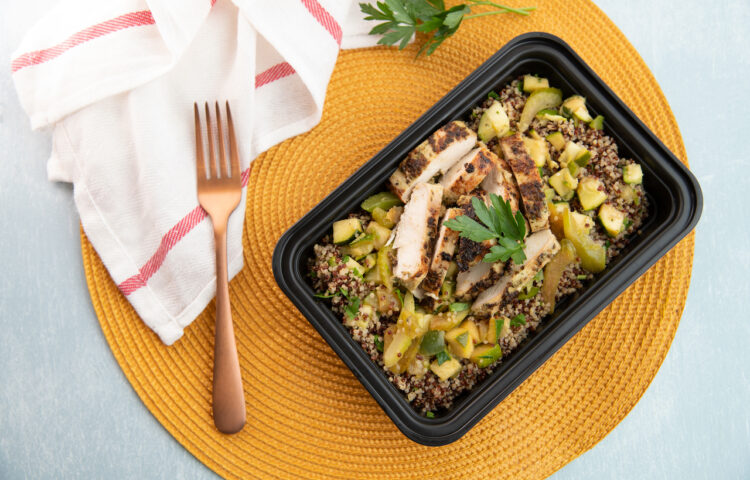Eating a healthy and balanced diet is essential for maintaining good health and achieving fitness goals. As the saying goes, “you are what you eat,” and this is especially true when it comes to fitness. Consuming nutritious foods can help improve your physical performance, boost your energy levels, and aid in recovery after exercise.
Catered Fit’s meals are an excellent choice for individuals who are looking to achieve their fitness goals. Our company offers a wide range of nutritious meals that are tailored to meet different dietary needs, including weight loss, muscle gain, and overall health and wellness. Each meal is made from fresh, high-quality ingredients and is carefully portioned to ensure that you get the right balance of macronutrients and calories to support your fitness goals. Whether you are looking to slim down, build muscle, or simply maintain a healthy weight, Catered Fit’s meals are the perfect solution. With our convenient delivery options and easy-to-use ordering system, it’s never been easier to eat healthy and stay on track with your fitness goals.
In this article, we will discuss the importance of fitness meals and provide tips for creating healthy and delicious meals that will help you reach your fitness goals.
Why are Fitness Meals Important?
Fitness meals are meals that are specifically designed to meet the nutritional needs of individuals who engage in physical activity. These meals are typically high in protein, complex carbohydrates, healthy fats, and essential vitamins and minerals. Consuming these nutrients before and after exercise can help improve physical performance, enhance muscle recovery, and prevent injury.
Protein is particularly important for fitness meals as it is essential for building and repairing muscle tissue. When you engage in physical activity, your muscle fibers break down, and protein is needed to repair and rebuild them. Consuming protein-rich foods such as lean meats, fish, eggs, and legumes can help ensure that your body has the necessary building blocks to repair and rebuild muscles after exercise.
Carbohydrates are also essential for fitness meals as they provide the body with energy. Complex carbohydrates such as whole grains, fruits, and vegetables are the best sources of energy as they are digested slowly, providing a steady stream of fuel for the body. Consuming carbohydrates before exercise can help improve physical performance, while consuming them after exercise can help replenish energy stores and aid in recovery.
Healthy fats are another important component of fitness meals. Fats are essential for proper hormone function, brain health, and energy production. Consuming healthy fats such as those found in nuts, seeds, avocado, and fatty fish can help support overall health and improve physical performance.
Creating Fitness Meals
Creating fitness meals doesn’t have to be complicated or time-consuming. With a little bit of planning and preparation, you can create healthy and delicious meals that will fuel your body and help you reach your fitness goals.
Here are some tips for creating fitness meals:
Plan Ahead: Planning is key when it comes to creating fitness meals. Take some time each week to plan out your meals and snacks. This will help ensure that you have all the necessary ingredients on hand and prevent you from reaching for unhealthy options when you’re short on time.
Focus on Whole Foods: When creating fitness meals, focus on whole, nutrient-dense foods such as lean proteins, complex carbohydrates, and healthy fats. Avoid processed foods, which are often high in sugar, salt, and unhealthy fats.
Include Protein in Every Meal: As previously mentioned, protein is essential for muscle repair and growth. Make sure to include a source of protein in every meal, such as chicken, fish, tofu, or beans.
Choose Complex Carbohydrates: Complex carbohydrates are the best source of energy as they are digested slowly, providing a steady stream of fuel for the body. Choose complex carbohydrates such as whole grains, fruits, and vegetables over refined carbohydrates such as white bread and pasta.
Don’t Fear Healthy Fats: Healthy fats are essential for overall health and can help improve physical performance. Include sources of healthy fats such as nuts, seeds, avocado, and fatty fish in your meals.
Snack Smart: Snacking can be an important part of a fitness meal plan. Choose healthy snacks such as fruit, nuts, and veggies with hummus to help keep you fueled throughout the day.
Hydrate: Proper hydration is essential for good health and physical performance. Make sure to drink plenty of water throughout the day, especially before, during, and after exercise. Dehydration can lead to fatigue, cramping, and decreased performance.
Experiment with Flavor: Healthy eating doesn’t have to be boring. Experiment with herbs, spices, and different cooking techniques to add flavor to your meals without adding unhealthy ingredients.
Don’t Forget Recovery Meals: After exercise, it’s important to consume a recovery meal that includes protein and carbohydrates to aid in muscle recovery and replenish energy stores. This can be as simple as a protein shake or a meal that includes lean protein and complex carbohydrates.
Seek Professional Advice: If you’re unsure about how to create a fitness meal plan that’s right for you, seek the advice of a registered dietitian or a certified personal trainer. They can help you create a plan that meets your individual needs and goals.
Conclusion
Eating a healthy and balanced diet is essential for maintaining good health and achieving fitness goals. Fitness meals that are high in protein, complex carbohydrates, healthy fats, and essential vitamins and minerals can help improve physical performance, boost energy levels, and aid in recovery after exercise. By planning ahead, focusing on whole foods, including protein in every meal, choosing complex carbohydrates, incorporating healthy fats, snacking smart, staying hydrated, experimenting with flavor, not forgetting recovery meals, and seeking professional advice when necessary, you can create healthy and delicious fitness meals that will fuel your body and help you reach your fitness goals.

